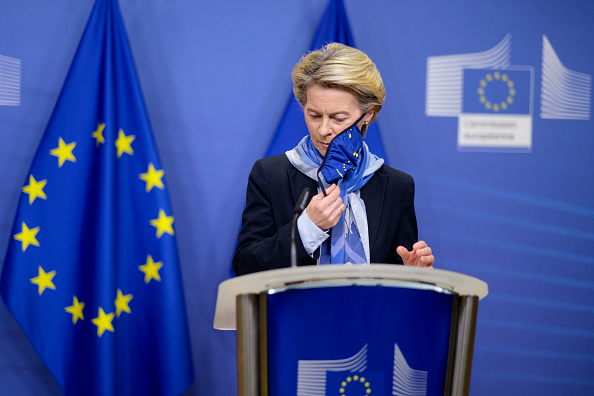Amidst a heated election campaign in Poland, observers have witnessed a ground-breaking and unprecedented event—an open letter from representatives of nine countries addressed to the European Court of Human Rights (ECHR), calling for a “new interpretation” of the 1950 Convention for the Protection of Human Rights and Fundamental Freedoms. This document remains one of the most significant instruments of international law shaping the human rights protection system across the member states of the Council of Europe. The letter—initiated by Italian Prime Minister Giorgia Meloni and her Danish counterpart Mette Frederiksen—was not merely a symbolic or political gesture. Rather, it signaled a profound paradigm shift in the perception of “human rights” within a Europe currently grappling with a deep identity crisis.
“The Strasbourg Court Will Not Spit in Our Faces!”
The open letter, signed by the prime ministers of Austria, Latvia, Lithuania, Poland, Belgium, Estonia, and the Czech Republic—alongside Denmark and Italy—was reported by Politico website on May 22. Germany’s Deutsche Welle emphasized that the letter constituted a de facto political act, undertaken in the presence of representatives from various political parties, and quoted Council of Europe Secretary General Alain Berset as warning that such public declarations could amount to unacceptable political pressure on the ECHR.
What motivated representatives of multiple governments to take such a radical step, effectively challenging the accuracy and legitimacy of the rulings of the Council of Europe’s judicial body? The central issue lies in the ECHR’s established jurisprudence, which limits states’ ability to deport immigrants, including those convicted of serious crimes such as terrorism.
This is not a new problem. In 2022, the ECHR blocked the UK government from deporting the first group of immigrants to Rwanda who had crossed the English Channel illegally. The British government had reached an agreement with Rwanda to return the detainees, where they were to await the outcome of their asylum claims. A similar agreement was later concluded between Italy and Albania. The ECHR’s interim measure, issued overnight, halted the deportations at the last moment, prompting strong protests from London and renewed calls for the UK to withdraw from the Convention for the Protection of Human Rights and Fundamental Freedoms, thereby distancing itself from a human rights system perceived as infringing upon national sovereignty.
The UK government went beyond expressing dissatisfaction. In 2024, Parliament passed the Rwanda Security Act, mandating that all decision-makers—including courts and migration officers—treat Rwanda as a “safe country” and therefore suitable for the return of migrants who entered the UK illegally. The law further stipulated that the government alone would decide whether to comply with ECHR interim measures, placing such decisions in the hands of a minister of His Majesty’s Government.
France, too, is showing signs of impatience with the ECHR. In October 2023, following an Islamist terrorist attack in Arras, Interior Minister Gérald Darmanin declared: “We will identify dangerous individuals across the country, systematically revoke residence permits for foreigners, and systematically expel any foreign national deemed dangerous by the intelligence services.” He simultaneously acknowledged that such actions might provoke sanctions from the Strasbourg Court under the Convention.
In November 2023, French authorities deported a 39-year-old Uzbek migrant in defiance of an ECHR interim order that prohibited his return due to the risk of torture. The Interior Ministry had classified the man as a radical Islamist and proceeded with his expulsion before the administrative court had reviewed his appeal. While in 2018 the ECHR found France in violation of the Convention for deporting migrants without allowing them to file an effective complaint, this latest act—according to Le Monde—constituted open defiance of the Court’s authority.
Greece, long burdened by irregular migration, has also faced repeated criticism for its disregard of ECHR rulings. Greek authorities often force smuggling boats to turn back, primarily toward Turkey. In 2022, the ECHR issued a landmark judgment in Safi and Others v. Greece (Application No. 5418/15), awarding compensation of €10,000 to €100,000 for violations of Article 3 (prohibition of inhuman and degrading treatment) after Greek authorities had conducted a mass search and restricted the freedom of movement of a group of Syrian, Afghan, and Palestinian nationals rescued at sea.
Furthermore, Greece ignored an ECHR interim measure issued on June 3, 2022, which prohibited the deportation of 28 Kurdish refugees from Syria stranded on a river islet in the Evros region near the Turkish border. The deportation was carried out, demonstrating Greece’s growing disregard for Strasbourg’s rulings.
Is the Court Disregarding Citizens’ Safety?
In Ben Khemais v. Italy (Application No. 246/07), the Court found Italy in violation of Article 3 (prohibition of torture and inhuman or degrading treatment) and Article 34 (right to petition the Court) by deporting a Tunisian national convicted of terrorism, despite an interim measure blocking the deportation. The man had already been convicted by Italian courts.
Similarly, in Mannai v. Italy (Application No. 9961/10), the ECHR held that Italy violated the same provisions by deporting a Tunisian national convicted by Italian courts. In Toumi v. Italy (Application No. 25716/09), the Court awarded €15,000 in damages to a Tunisian citizen sentenced to six years’ imprisonment for terrorist offenses. After serving his sentence, the Italian authorities deported him to Tunisia, in direct contravention of an ECHR interim measure. The Court concluded that Italy had failed to comply with the Convention and had violated the applicant’s human rights.
A particularly instructive case is that of M.A. v. France (Application No. 9373/15), which highlights the measures states are willing to take to ensure the removal of individuals deemed undesirable. The applicant, an Algerian citizen, had been sentenced to seven years in prison in 2006 and was permanently banned from France for involvement in a terrorist conspiracy. In 2010, the French authorities attempted to deport him, but the ECHR blocked the action pending a final ruling. He remained in France for four years until the ECHR dismissed his complaint for failure to exhaust domestic remedies.
In December 2014, Mr. M.A. filed for asylum, which was denied by the French Office for the Protection of Refugees and Stateless Persons (OFPRA). He received the decision on February 20 while at a police station. The authorities immediately detained him and executed the deportation order. His lawyer submitted another request for an interim measure to the ECHR, which was granted that same day. However, the plane had already departed, and the applicant was flown to Algeria, where he was arrested upon arrival.
The Court ruled that France had violated Article 3 of the Convention, as the authorities knew he risked mistreatment in Algeria, and Article 34, as the deportation deprived him of an effective opportunity to appeal.
A separate matter concerns complaints filed with the ECHR by migrants who failed to illegally enter Polish territory during the hybrid operation orchestrated by Belarus and Russia. Some of these complaints pertain to the alleged use of so-called pushbacks by Polish soldiers and border guards. The ECHR’s Grand Chamber is currently examining the case of a group of Afghan nationals who claim to have been stranded in a makeshift camp at the Belarus-Poland border between August 8 and October 23, 2021. They allege they were subsequently returned to Afghanistan, where they remain to this day.
Human Rights in “Liberal” Europe – What Are They Exactly?
The cases described above highlight the growing tension between the rulings of the Strasbourg Court and the actions of European governments that prioritize citizen security and public order. The increasing number of official voices calling for a reassessment of the ECHR’s jurisprudence, as well as the outright disregard for its interim measures, suggest that Europe is approaching a pivotal moment. A revolution in the dominant “liberal” conception of human rights appears imminent. My guess is that our civilisation is undergoing a profound transformation that could lead to the collapse of the current human rights framework.
It is important to understand that the modern conception of human rights is rooted in an individualistic anthropology. This ideological foundation, pioneered by John Locke, introduced a fundamental distinction in European thought between public authority and the natural rights of the individual, which exist independently of the state. Locke’s Two Treatises of Government (1690) articulated these rights as “life, liberty, and property,” inherent to individuals even in a pre-social condition.
Locke asserted that a government established through a social contract must not only refrain from infringing upon these rights but is also obligated to protect them. Should a government fail in this duty, it loses its legitimacy. Notably, Locke’s view differs from that of Thomas Hobbes, whose Leviathan (1651) conceived the state as the outcome of a consensual surrender of individual freedom to a sovereign whose primary role is to ensure peace and security. Under this contract, individuals agreed to transfer all of their natural freedom to the sovereign, whose sole purpose is to ensure the peace and security of the citizens. To this end, the sovereign—according to Hobbes—could employ any means necessary, including censorship, corporal punishment, and imprisonment.
From Locke onward, and especially with the rise of liberalism in Europe, the emphasis on personal freedoms increasingly eclipsed the sovereign’s mandate to ensure public order and safety. This shift is clearly visible today in debates over surveillance and national security in the face of terrorism.
The “liberal” conception of human rights, from which other conceptions of iura humana (eg, Christian) are distinguished in political-legal thought, presupposes not only the individual’s possession of a sphere inviolable to public authority (“freedoms” and “rights”). It effectively replaces traditional notions of “duty,” central to conservative or national traditions, with a constant stream of legal affirmations of rights—what we might call the “juridification” of human rights. Moreover, the liberal conception allows for an ever-expanding catalogue of rights due to its grounding in moral relativism and individualism. These rights increasingly apply to ever-more fragmented social groups, and the state or international community is expected to recognise and enforce them.
In post-war Europe, this has resulted in what might be called an “inflation” of human rights. As the legal scholar Grégor Puppinck notes, international legal documents increasingly reflect a “degeneration” of the human rights concept. No longer limited to fundamental freedoms such as the right to life, freedom of expression, or freedom of assembly, the category now includes “reproductive rights”—which can conflict with the classical right to life—and the “right to gender identity,” which is treated as stemming from the right to privacy.
Human rights in the liberal version are inherent to the so-called liberal democracy, which—assumed to be an ‘ideal’ political form—is expected to dominate within the Western civilizational sphere and to be transferred to other regions of the world (Francis Fukuyama). They are also inextricably linked to the system of human rights protection that emerged in Europe after World War II, the most important institution of which is the Strasbourg Court. It is this body of the Council of Europe that is responsible for interpreting the provisions of the Convention for the Protection of Human Rights and Fundamental Freedoms.
Human Rights in Disarray
Modern Europe underwent a profound transformation after World War II. One does not have to be a particularly astute observer to recognise that Western civilization has been undergoing an identity crisis for years: It no longer captivates the world’s imagination and has ceded ground to much stronger political and cultural centres—particularly in Asia. When we add to this the growing influx of immigrants from culturally disparate regions, the accompanying perceived decline in public security, and the economic impoverishment of European societies, we are presented with a volatile mix that could lead to a rapid explosion of public discontent. This process is already unfolding in countries such as Italy, France, Germany, Austria, Sweden, the Netherlands, and, of course, Poland. The significant public support for Donald Trump in the United States is further confirmation of this trend.
The gradual shift in public sentiment across the Old Continent—where people are awakening from the dream of a powerful, wealthy, secure, and admired Europe—is meeting fierce resistance from the so-called liberal-left elites. Ironically, voices now calling for radical restrictions on freedom of speech (including censorship of the internet), the use of undemocratic measures against right-wing movements (eg, the concept of “militant democracy” openly invoked by Polish Prime Minister Donald Tusk), the banning of social organisations and political parties, the invalidation of election results (as in the case of Călin Georgescu in Romania), and the political neutralisation of party leaders (such as Marine Le Pen in France) are often coming from those who claim to be defenders of freedom.
This results in growing disregard for the will of the voters and the formation of the most ideologically incoherent cordon sanitaire coalitions—even including far-left or pro-Russian elements, as seen in France—whose sole purpose is to prevent those opposed to the liberal-left monopoly from assuming power. Similarly, the involvement of EU institutions—which have shifted from being primarily economic in nature to overtly political actors dominated by a select few—must be assessed critically, as they increasingly interfere with and attempt to discipline the governments of individual member states. The idea that the rising popularity of conservative, traditionalist, or nationalist movements can be stifled resembles trying to seal gas in a bottle with a cork: Sooner or later, the pressure will trigger a much more destructive release.
So-called liberal democracy no longer appears to be a system that truly respects the will of the people, guarantees the universality of the vote, upholds freedom, or protects the separation of powers, the rule of law, or parliamentary governance. Despite its name, it has increasingly little in common with genuine democracy or a commitment to liberty. Before our eyes, the much-celebrated union between liberalism and democracy is unravelling—something Alexis de Tocqueville already foresaw in the 19th century. Liberal democracy has evolved into a system in which the entire political and legal apparatus is designed to ensure the continued dominance of an increasingly narrow liberal-left elite.
And where do human rights fit into all of this? It is worth recalling what Adam Wielomski, writing from a conservative standpoint, noted back in 2007 in Volume I of Encyklopedia Polityczna (Political Encyclopedia):
“Paradoxically, human rights—originally conceived as a counterweight to absolutism and as a celebration of democracy and liberalism—are transforming into an extremely intolerant political ideology, which rejects all other forms of government aside from parliamentary democracy. In practice, this ideology goes even further; human rights have become a tool through which a handful of leftist intellectuals—supported by the media—seek to impose their will on sovereign states, reshaping them in accordance with their own ideological vision. Thus, human rights, which were once devised as a bulwark against political absolutism, have themselves become the ideology of a new absolutism.”
It is difficult not to see the relevance of these words in 2025. In a Europe where security is eroding and where citizens increasingly perceive that political authorities are unable to manage immigration or guarantee safety, there are mounting calls for a departure from John Locke’s vision of the state and a return to the Hobbesian Leviathan. Political power is once again being seen as the necessary guarantor of public order and citizen safety. In moments so critical to the survival of the political community, constraints such as “human rights,” abstract principles of “decency,” or appeals to “morality” begin to lose their practical significance. The same pattern is visible in the United States, where a hard-line approach to deporting undocumented immigrants secured Donald Trump’s electoral victory.
So, are we witnessing the beginning of a spectacular collapse of the human rights system in Europe, with individual states withdrawing from the protective framework of the 1950 Rome Convention? This possibility cannot be dismissed. Amid rising public expectations, tensions between national governments and the European Court of Human Rights (ECHR) are bound to intensify. The recent letter from the prime ministers of nine countries serves as a clear indicator of this trajectory. That said, the unravelling need not happen suddenly. Article 15 of the European Convention on Human Rights allows states to take “measures derogating from the obligations under this Convention to the extent strictly required by the exigencies of the situation,” not only in times of war but also in cases of a “public emergency threatening the life of the nation.”
Could this become the next step taken by Council of Europe member states, especially as they confront growing threats to citizen safety and the rise of Islamic radicalism within their political communities? It seems increasingly likely. And in the face of a manifest crisis in the liberal conception of human rights, will the West find a new foundation for protecting human dignity within the state? Might this involve a return to classical and Christian axiological traditions? Or—as Polish Supreme Court Judge Alexander Stępkowski has argued—is the very concept of human rights fundamentally at odds with the social doctrine of the Catholic Church, given that it is rooted in an individualistic anthropology? If so, perhaps it is time to seriously reconsider the foundations of political community and human coexistence—not on the basis of human rights as we know them today, but on a vision that reflects the inherently social nature of the human person.
Bartosz Lewandowski, attorney at law (Polish Bar Association in Warsaw), PhD, working with the Ordo Iuris Institute for Legal Culture





Tusk calls it ‘militant democracy’ as he rejects and violates decisions by the courts